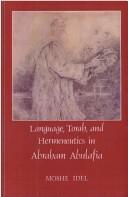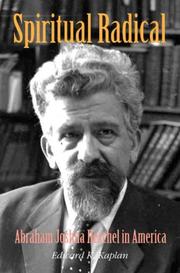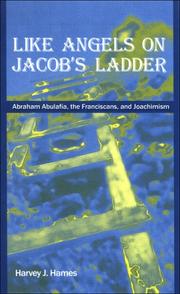| Listing 1 - 10 of 100 | << page >> |
Sort by
|
Book
ISBN: 9780827614819 0827614810 9780827613638 0827613636 Year: 2018 Publisher: Philadelphia
Abstract | Keywords | Export | Availability | Bookmark
 Loading...
Loading...Choose an application
- Reference Manager
- EndNote
- RefWorks (Direct export to RefWorks)
Bible. --- Ḥayyei Sarah --- Parashat Elʻazar ʻeved Avraham --- Parashat Eliʻezer ʻeved Avraham --- Parashat Ḥaye Śarah --- Parashat Ḥayyei Sarah
Book
ISBN: 9783161502033 3161502035 Year: 2011 Publisher: Tübingen : Mohr Siebeck,
Abstract | Keywords | Export | Availability | Bookmark
 Loading...
Loading...Choose an application
- Reference Manager
- EndNote
- RefWorks (Direct export to RefWorks)
Cabala. --- Hermeneutics. --- Kabbale --- Herméneutique --- Gikatilla, Joseph ben Abraham, --- G'iḳaṭilyah, Yosef Avraham --- Gikatilia, Josef ben Abraham. --- Criticism and interpretation. --- G'iḳaṭilyah, Yosef ben Avraham
Book
ISBN: 9652781479 Year: 1992 Publisher: Jeruzalem The Israel Museum
Abstract | Keywords | Export | Availability | Bookmark
 Loading...
Loading...Choose an application
- Reference Manager
- EndNote
- RefWorks (Direct export to RefWorks)
art [fine art] --- Art --- Eilat, Avraham --- anno 1900-1999 --- Israel --- art [discipline]
Book
ISBN: 2204045640 9782204045643 Year: 1992 Publisher: Paris : Ed. du Cerf,
Abstract | Keywords | Export | Availability | Bookmark
 Loading...
Loading...Choose an application
- Reference Manager
- EndNote
- RefWorks (Direct export to RefWorks)
Judaïsme --- Rabbins --- Sionisme. --- Histoire des doctrines. --- Philosophie. --- Kook, Avraham Yishaq hak-kohen, --- Judaïsme --- Philosophie juive
Book
ISBN: 1315691043 1317428935 1317428927 9781317428930 9781315691046 9781138914032 1138914037 Year: 2016 Publisher: London
Abstract | Keywords | Export | Availability | Bookmark
 Loading...
Loading...Choose an application
- Reference Manager
- EndNote
- RefWorks (Direct export to RefWorks)
Mysticism --- Sufism. --- Judaism --- Islam --- Jewish-Arab relations --- Judaism. --- Islam. --- Relations --- Derekh Avraham Order.
Book
ISBN: 9782913372702 2913372708 Year: 2007 Publisher: Paris : La Fabrique éditions,
Abstract | Keywords | Export | Availability | Bookmark
 Loading...
Loading...Choose an application
- Reference Manager
- EndNote
- RefWorks (Direct export to RefWorks)
Intellectuels juifs --- Intellectuels --- Activité politique --- Oz, Amos --- Yehoshua, Avraham B. --- Halimi, Ilan --- Assassinat.
Book
ISBN: 9004280812 9789004280816 9789004280809 9004280804 1322872821 Year: 2015 Publisher: Leiden, The Netherlands : Koninklijke Brill,
Abstract | Keywords | Export | Availability | Bookmark
 Loading...
Loading...Choose an application
- Reference Manager
- EndNote
- RefWorks (Direct export to RefWorks)
Avi Sagi is Professor of Philosophy at Bar Ilan University in Ramat Gan, Israel, and Senior Fellow at the Shalom Hartman Institute in Jerusalem, Israel. A philosopher, literary critic, scholar of cultural studies, historian and philosopher of halakhah, public intellectual, social critic, and educator, Sagi has written most lucidly on the challenges that face humanity, Judaism, and Israeli society today. As an intertextual thinker, Sagi integrates numerous strands within contemporary philosophy, while critically engaging Jewish and non-Jewish philosophers. Offering an insightful defense of pluralism and multiculturalism, his numerous writings integrate philosophy, religion, theology, jurisprudence, psychology, art, literature, and politics, charting a new path for Jewish thought in the twenty-first century.
Jewish philosophy. --- Philosophy --- Mental philosophy --- Humanities --- Jews --- Philosophy, Jewish --- Philosophy, Israeli --- Sagi, Abraham --- Śagi, Avi --- Śagi, Avraham --- Schweitzer, Abraham --- Shṿaitser, Avraham --- שגיא, אברהם --- שגיא, אבי --- שגיא, צבי --- Philosophy.

ISBN: 0887068316 0887068324 Year: 1989 Publisher: Albany State University of New York Press
Abstract | Keywords | Export | Availability | Bookmark
 Loading...
Loading...Choose an application
- Reference Manager
- EndNote
- RefWorks (Direct export to RefWorks)
Hebrew language --- Cabala --- Kabbale --- Philosophy --- History --- Histoire --- Abulafia, Abraham ben Samuel, --- Jewish language --- Jews --- Semitic languages, Northwest --- Languages --- Aboulafia, Abraham, --- Abraham ben Samuel Abu-lʹ-afyah, --- Abu-lʹ-afyah, Abraham ben Samuel, --- Abulafia, Abraham, --- Abulʼafya, Avraham, --- Abulʼafya, Avraham ben Shemuʼel, --- Abulʼafyah, Avraham, --- Avraham, --- אבולעפיא, אברהם --- אבולעפיא, אברהם בן שמואל --- אבולעפיא, אברהם בן שמואל, --- אבולעפיה, אברהם --- אבולעפיה, אברהם, --- אבולעפיה, אברהם בן שמואל --- אבולעפיה, אברהם בן שמואל, --- אבולעפיה, אברהם. כהן, רפאל --- Philosophy.

ISBN: 9780300115406 Year: 2007 Publisher: New Haven ; London Yale University Press
Abstract | Keywords | Export | Availability | Bookmark
 Loading...
Loading...Choose an application
- Reference Manager
- EndNote
- RefWorks (Direct export to RefWorks)
Rabbis --- Jewish scholars --- 296*635 --- Judaisme--?*635 --- Heschel, Abraham Joshua, --- Heshel, Abraham Joshua, --- Heschel, Abraham J. --- Heschel, A. J. --- Heshl, Avraham Yehoshuʻa, --- Heshel, Avraham Yehoshuʻa, --- Heshil, Avraham Yehoshuʻa, --- Гешель, Авраам Иехошуа, --- העשיל, אברהם יהושע, --- העשל, אברהם --- העשל, אברהם יהושע --- העשל, אברהם יהושע, --- השיל, אברהם יהושע השיל, --- השל, אברהם יהושע --- השל, אברהם יהושע העשל, --- השל, אברהם יהושע, --- השל, אברהם יהישע --- Heschel, Abraham Joshua --- United States --- Biography

ISBN: 0791479188 143563294X 9781435632943 9780791479186 079147271X 9780791472712 9780791479186 Year: 2007 Publisher: Albany : State University of New York Press,
Abstract | Keywords | Export | Availability | Bookmark
 Loading...
Loading...Choose an application
- Reference Manager
- EndNote
- RefWorks (Direct export to RefWorks)
This book explores the career of Abraham Abulafia (ca. 1240–1291), self-proclaimed Messiah and founder of the school of ecstatic Kabbalah. Active in southern Italy and Sicily where Franciscans had adopted the apocalyptic teachings of Joachim of Fiore, Abulafia believed the end of days was approaching and saw himself as chosen by God to reveal the Divine truth. He appropriated Joachite ideas, fusing them with his own revelations, to create an apocalyptic and messianic scenario that he was certain would attract his Jewish contemporaries and hoped would also convince Christians. From his focus on the centrality of the Tetragrammaton (the four letter ineffable Divine name) to the date of the expected redemption in 1290 and the coming together of Jews and Gentiles in the inclusiveness of the new age, Abulafia's engagement with the apocalyptic teachings of some of his Franciscan contemporaries enriched his own worldview. Though his messianic claims were a result of his revelatory experiences and hermeneutical reading of the Torah, they were, to no small extent, dependent on his historical circumstances and acculturation.
History --- Judaism --- Salvation. --- Ecstasy (Judaism) --- Cabala --- Brotherhood Week --- Salvation --- Religion --- Mysticism --- Religious aspects --- Christianity --- History of doctrines --- Relations --- Christianity. --- History. --- Joachim, --- Abulafia, Abraham ben Samuel, --- Fiore, Gioacchino da, --- Fiore, Joachim von, --- Gioacchino, --- Gioachino, --- Joachimus, --- Pseudo-Joachim, --- Aboulafia, Abraham, --- Abraham ben Samuel Abu-lʹ-afyah, --- Abu-lʹ-afyah, Abraham ben Samuel, --- Abulafia, Abraham, --- Abulʼafya, Avraham, --- Abulʼafya, Avraham ben Shemuʼel, --- Abulʼafyah, Avraham, --- Avraham, --- אבולעפיא, אברהם --- אבולעפיא, אברהם בן שמואל --- אבולעפיא, אברהם בן שמואל, --- אבולעפיה, אברהם --- אבולעפיה, אברהם, --- אבולעפיה, אברהם בן שמואל --- אבולעפיה, אברהם בן שמואל, --- אבולעפיה, אברהם. כהן, רפאל --- Kabbale --- Extase --- Salut --- Judaïsme --- Histoire --- Christianisme --- Aspect religieux --- Histoire des doctrines
| Listing 1 - 10 of 100 | << page >> |
Sort by
|

 Search
Search Feedback
Feedback About UniCat
About UniCat  Help
Help News
News